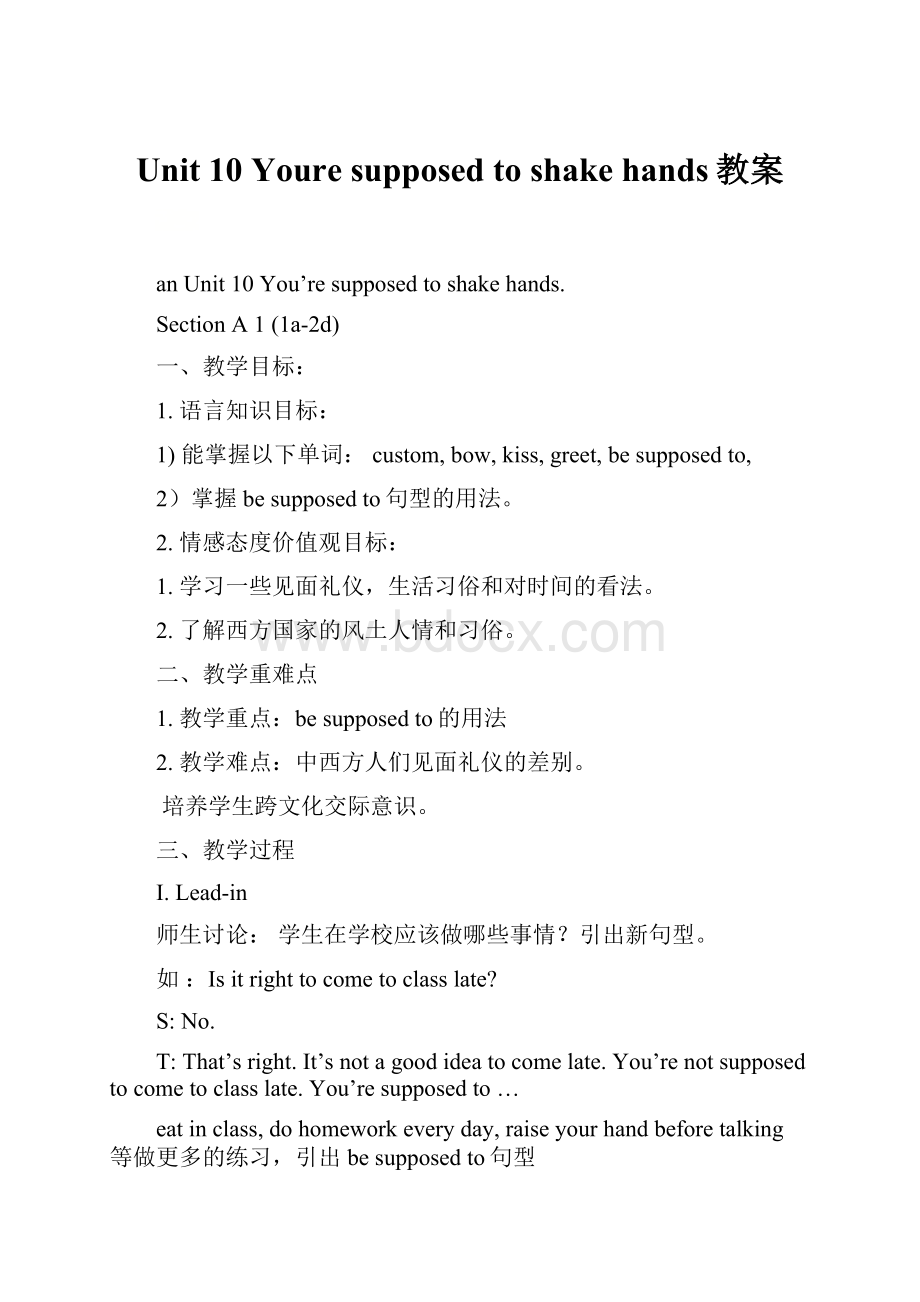Unit 10 Youre supposed to shake hands教案.docx
《Unit 10 Youre supposed to shake hands教案.docx》由会员分享,可在线阅读,更多相关《Unit 10 Youre supposed to shake hands教案.docx(41页珍藏版)》请在冰豆网上搜索。

Unit10Youresupposedtoshakehands教案
anUnit10You’resupposedtoshakehands.
SectionA1(1a-2d)
一、教学目标:
1.语言知识目标:
1)能掌握以下单词:
custom,bow,kiss,greet,besupposedto,
2)掌握besupposedto句型的用法。
2.情感态度价值观目标:
1.学习一些见面礼仪,生活习俗和对时间的看法。
2.了解西方国家的风土人情和习俗。
二、教学重难点
1.教学重点:
besupposedto的用法
2.教学难点:
中西方人们见面礼仪的差别。
培养学生跨文化交际意识。
三、教学过程
I.Lead-in
师生讨论:
学生在学校应该做哪些事情?
引出新句型。
如:
Isitrighttocometoclasslate?
S:
No.
T:
That’sright.It’snotagoodideatocomelate.You’renotsupposedtocometoclasslate.You’resupposedto…
eatinclass,dohomeworkeveryday,raiseyourhandbeforetalking等做更多的练习,引出besupposedto句型
II.Discussion
T:
Howdopeoplegreetoneanotherincountriesaroundtheworld?
Workinpairsanddiscussthequestion.
S:
…
利用多媒体播放各种见面的礼仪,学习新单词:
custom,bow,kiss,greet,hug,namaste
III.Workon1a-1c
1.Workon1a
多媒体呈现1a图片,让学生根据图画内容,说说图中的握手,接吻,鞠躬是哪个国家的礼仪,然后按要求把书本给出的“国家”和“习俗”连接起来。
老师不要给出答案。
2.Listening1b.
Listentotherecordingandcheckyouranswerstoactivitiesin1a.
3.Listenagainandfillintheblanks.
Yoshi:
Whatarepeople_________todowhentheymeetinyourcountry,Rodrigo?
Rodrigo:
Doyoumeanwhenpeoplemeetforthefirsttime?
Yoshi:
Yeah.
Rodrigo:
InMexico,we___________.
Yoshi:
WhataboutinBrazil,Celia?
Celia:
Well,inBrazil,peoplesometimes____.HowaboutinJapan,Yoshi?
Whatarepeopleexpectedtodowhentheymeetforthefirsttime?
Yoshi:
We_______.
Kim:
AndinKoreawealsobow.
Mike:
Well,IguessinmostWesterncountrieswe_____________.
4.Pairwork:
A:
WhatarepeopleinKorea/…todowhentheymeetforthefirsttime?
B:
Theyaresupposedtobow.HowaboutintheUnitedStates?
A:
They’resupposedtoshakehands.
5.教师介绍本单元的目标语言:
You’resupposedto….
Ⅳ.Listening
1.Listento2a.WhatmistakesdidMariamake?
2.Finish2a.
3.Listento2bandfillintheblanks.
1)Mariawassupposedtoarriveat7:
00,butshe_____________.
2)InMaria’scountry,whenyou’reinvitedfor7:
00,you’reexpectedto___________.
3)WhenMariametPaul’smom,shewassupposedto___________.
4)Mariashouldaskwhatsheissupposedto_____ifsheisinvitedtoaparty
nexttime.
4.Pairwork
Readthelisteningtextandactoutthedialogue.
Role-playaconversationbetweenMariaandDan.
Dan:
HowwasthedinneratPaul’shouselastnight?
Maria:
Well,itwasOK,butImadesomemistakes.Iwassupposedtoarriveat7:
00,butI…
V.Roleplay
Workon2d
Role-playtheconversationbetweenKatieandJohn.
Readtheconversationagainandanswerthesequestions:
1.WhatdoesJohnthinkofthewelcomeparty?
Great.
2.What’sthenameoftheJapaneseboydidJohnmeet?
Sato.
3.DidJohnreturnthebowintheend?
Yes,hedid.
4.WhatdidKatiedowhenshefirstmetMarielastyear?
Sheheldoutherhand.
5.WhatareFrenchpeoplesupposedtodowhentheyseeeachother?
Theyaresupposedtokiss.
Fillintheblanksaccordingtotheconversation.
Thewelcomepartyforforeignstudentslastnightwasgreat.AndJohnfoundafunnything:
differentcountrieshavedifferentcustoms.People________________dodifferentlywhentheymeetforthefirsttime.InJapan,people_______________bowwhentheymeet.InFrance,people______________kisswhentheyseeeachother.WheninRome,doastheRomansdo.
VI.Consolidation
完成任务:
礼仪大荟萃
WheninRome,doastheRomansdo.
让学生展示上课前通过网络或书籍等形式查找到的各国礼仪,并分类记录,制成表格。
VII.Languagepoints
进一步向学生讲解本单元的目标语言:
besupposedto,beexpectedto.
1.Youaresupposedtoshakehands.
besupposedtodo…“应该……被期望做……”,当句子的主语是____时,它可
以用来表示__________________________等,意思是“tobeexpectedtodosth.,ortohavetodosth.”人;劝告,建议,义务,责任
e.g.You’resupposedtoasktheteacherifyouwanttoleavetheclassroom.
如果你要离开教室,应该先问问老师。
WearenottosupposedtoplayfootballonSunday.
不准我们在星期日踢足球。
2.That’showpeopleinJapanareexpectedtogreeteachother.
greet=towelcomeorsay“hello”动词“问候,打招呼”
e.g.Hegreetedherbysaying“goodmorning”.
他向她打招呼说“早上好”。
Shegreetedmewithafriendlysmile.她向我微笑致意。
beexpectedto有望做某事;被期待做
e.g.Johnisexpectedtocometothepartytonight.
约翰应该会出席今晚的宴会。
3.Iheldoutmyhandandtomysurprise,shekissedmeonbothsidesofmyface!
toone’ssurprise令某人惊讶的是
e.g.Tomysurprise,theysaidokay.令我惊讶的是,他们说可以。
kisssb.on…=givesb.akisson…亲吻某人的……
e.g.Shekissedthechildontheforehead.
=Shegavethechildakissontheforehead.
她吻了孩子的额头。
VIII.Exercises
Ⅰ.根据句意,从方框中选择恰当的单词填空,有的需要变换形式。
custom,bow,side,greet,kiss
1.PeopleinJapanliketo_________toeachotherwhentheymeet.
2.Beforegoingtobed,Momoften_________meandsays“Goodnight”tome.
3.Differentcountrieshavedifferent_________.Weshouldlearnsomething
aboutthem.
4.Carla_________mewith“hello”,andIgaveherasweetsmileinreturn(作为回报).
5.Therearemanybeautifulflowersonboth_________oftheriver.
Ⅱ.根据汉语意思完成英语句子,每空一词(含缩略形式)。
1.海斯先生将被期待在会上发言。
Mr.Hayeswill__________________atthemeeting.
2.那就是马库斯与朋友们相处的方式。
__________Marcusgetsonwithhisfriends.
3.令每一个人惊讶的是,这个计划竟然成功了。
______________________,theplansucceeded.
4.在阅览室我们不应该大声说话。
We_______________talkloudlyinthereadingroom.
5.我哥哥一毕业就会找工作。
Mybrotherwilllookforajob________heleavesschool.
6.凯文没有去参加欢迎派对,那晚他觉得不舒服。
Kevindidn’tgotothe_____________.Hewasn’tfeelingwellthatnight.
7.那个小男孩伸出双手,开心地接过他的生日礼物。
Thelittleboy________hishandsandgothisbirthdaygifthappily.
8.上个月公司新来的那个年轻人犯了一些错误。
Theyoungmanwhoenteredourcompanylastmonthhas__________________.
Ⅲ.根据对话内容,在空白处填入恰当的单词,使对话完整、通顺。
A:
Howdoyoudo,Lingling?
B:
Howdoyoudo,Jean?
Oh,no.Inourcountry,wedon’tkisspeoplewhenwefirstmeetthem.
A:
Really?
HowamI
(1)_________togreetyou?
B:
InChina,weonly
(2)_________hands.
A:
Oh,sorry.
...
A:
Nicetomeetyou,Yoshi.
C:
Nicetomeetyou,too.Oh,Jean,we(3)_________inJapanwhenwemeetfor
thefirsttime.
A:
I’msorry(4)_________.
C:
Youshouldlearnmoreaboutdifferentgreetingsindifferent(5)_________.
A:
You’reright.Couldyoupleasehelpme?
C:
Ofcourse.
Ⅸ.Homework
1.Writeapassageaboutdifferentcustomsindifferentcountries.
2.Preview3a-3conpage75.
SectionA2(3a-3c)
一、教学目标:
1.语言知识目标:
1)学习掌握下列词汇:
relaxed,value,capital,noon,mad,effort,dropby,afterall,getmad,makeaneffort
2)复习besupposedto句型。
3)如何正确的阅读课文。
2.情感态度价值观目标:
1)通过“应该”与“不应该”进一步了解一些国家的礼仪和对时间的看法。
2)了解不同国家的不同的时间观念,加强对中国文化的理解。
二、教学重难点
1.教学重点:
1)掌握本部分出现的生词和词组,达到熟练运用的目标。
2)阅读短文,获得相关的信息。
通过阅读练习,来提高阅读能力。
2.教学难点:
1)阅读短文,获得相关的信息的能力。
2)理解并运用所学的词汇及表达方式。
三、教学过程
Ⅰ.Revision
Differentcountriesdifferentcustoms.
e.g.A:
Whatarepeoplesupposedtodowhentheymeetin...?
B:
Theyaresupposedtobow/kiss/shakehands....
Ⅱ.Warmingup
Areyousupposedtobeontimewhenyoumeetyourfriends?
Areyousupposedtocallyourfriendsbeforeyougototheirhousefordinner?
Areyousupposedtomakeplanstomeetyourfriends?
Butpeopleinothercountriesmayhavedifferentopinions.Let’staketwoofthemasexamples.
Ⅲ.Lead-in
1.展示一个哥伦比亚和瑞士风光的照片。
使学生熟悉这两个国家的情况,通过图片欣赏引出本节内容。
2.Lookatthepicturesandsaysomethingaboutthetwocountries.
WhatdoyouknowaboutSwitzerland?
WhatdoyouknowaboutColombia?
Ⅳ.Reading
Fastreading
1.Workon3a:
TellSstoreadthearticleandanswerthequestion:
InwhichcountryisitOKtobe15minuteslatefordinner?
Ssreadthearticlequicklyandtrytofindtheanswertothequestion.
2.方法指导:
首先,对原文材料迅速浏览,掌握全文的主旨大意。
速读全文,抓住中心主旨很有必要,在速读的过程中,应尽可能多地捕获信息材料。
其次,带着问题,再回到原文中去寻找、捕获有关信息。
做好这类题的要领是:
1).明确题意,顺藤摸瓜。
2).按照要求,寻找答案来源。
3).找准关键词,明白其暗示作用。
4)再读课文,看答案是否符合题意。
3.按指导的方法带着问题进行阅读。
4.最后,教师让部分学生说出自己的答案,并校对答案。
Key:
InColombia.
CarefulReading
Workon3b.Readthepassageagainandfillinthechart.
Ideasandcustomsabout…
Colombia
Switzerland
Beingontime
it’sOKtobelate
it’simportanttobeontime
Visitingafriend’shouse
dropin
whenevertheylike
alwayscallfirst
Makingplanswithfriends
don’tusuallymakeplans
alwaysmakeplans
Read3aagainanddecidewhetherthestatementsaretrue(T)orfalse(F).
()1.InColombia,it’sOKifyouarriveabitlateforadinner.
()2.PeopleinColombiausuallymakeplanstomeettheirfriends.
()3.InSwitzerland,peopleareprettyrelaxedabouttime.
()4.InSwitzerland,peoplenevervisitafriend’shousewithoutcallingfirst.
Postreading
1.Role-playaconversationbetweenTeresaandMarc.TeresaislateandMarcismad.
注意使用目标语言:
In…,you’resupposedto…
A:
Hi,Marc.Sorry,I’malittlelate.
B:
Teresa,you’re10minuteslate!
A:
It’sjust10minutes!
It’snobigdeal!
B:
Well,inSwitzerland,you’resupposedto…
2.Fillintheblanks.
InColombia,peoplearepretty____________time.Theydon’tliketo______________.Theyoftenjust________theirfriends’homes.Theydon’tusuallyhaveto___________tomeettheirfriends.Oftentheyjustwalkaroundthetowncenter,seeingasmanyoftheirfriends_____theycan.
InSwitzerland,it’sveryimportanttobe_________.They’rethecapitalofclocksandwatches,_______.Theynevervisitafriend’shousewithout___________.Theyusuallymakeplanstoseefriends.Theyusually__________somethinginteresting,orgosomewheretogether.
Ⅴ.Languagepoints
1.WhereI’mfrom,weareprettyrelaxedabouttime.
在我们那个地方,我们的时间观念比较随意。
where用作连词,引导地点状语从句,说明主句行为发生的地点。
e.g.Remembertokeepthekidswhereyoucanseethem.
记住让孩子们待在你能看得见的地方。
relaxedadj.放松的,自在的
berelaxedabout…对……感到放松
e.g.不要害怕,轻松面试。
Don’tbeafraid,______________________________.
justberelaxedabouttheinterview
2.Wevaluethe